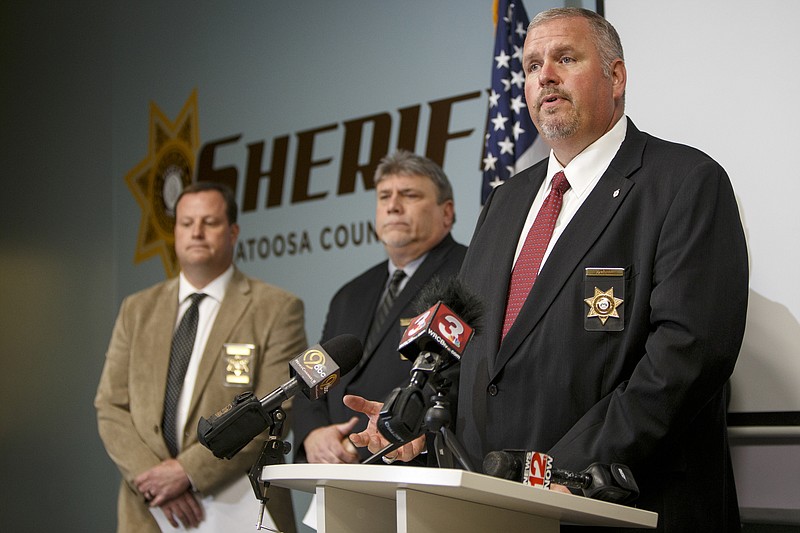Sheriffs from across North Georgia are speaking out against a bill that would allow the production and sale of low-potency medical marijuana oil within the state.
At a news conference Monday, the North Georgia Collaborative - a group of sheriffs from Catoosa, Chattooga, Dade, Gordon, Murray, Walker and Whitfield counties - challenged Georgia House Bill 324, calling it "rushed" and vague.
The bill was sponsored by Rep. Micah Gravley, R-Douglasville.
The North Georgia Collaborative of sheriffs includes:
> Sheriff Gary Sisk of Catoosa County> Sheriff Mark Schrader of Chattooga County> Sheriff Ray Cross of Dade County> Sheriff Mitch Ralston of Gordon County> Sheriff Gary Langford of Murray County> Sheriff Steve Wilson of Walker County> Sheriff Scott Chitwood of Whitfield County
The House Regulated Industries Committee already approved it last week, but the timing to move forward is tight. To survive, the bill must pass the full House by Thursday, the deadline for bills to pass out of one legislative chamber.
If passed, the law would allow the Georgia Department of Public Health to issue five production licenses to companies to grow unlimited amounts of cannabis or hemp for use in producing low-THC oil no later than Jan. 1, 2020. Each company could operate up to five retail outlets across the state.
"We all feel this is a danger to our society and our communities," said Catoosa County Sheriff Gary Sisk. "We feel the bill and the way that it is written have way far too many questions to bring about. There are large amounts of money that are involved that are questionable."
THC oil used to treat medical conditions was legalized in Georgia in 2015 for people with 16 diagnoses, but Georgians haven't be able to cultivate it or transfer it across state lines.
Gravely sat on a joint House and Senate committee that was tasked with studying access to the drug last year, which law enforcement also participated in. The committee eventually recommended that lawmakers consider providing licenses to grow, manufacture and dispense it within the state.
The sheriffs said their biggest concerns were the timeline of the bill, the lack of oversight, the lack of input from law enforcement or pharmaceutical boards and the potential for an influx of folks coming from other states to access retail outlets.
"There [are] no restrictions geographically as to where some of these outlets could be, the law sets it up that there could be up to 60 distribution retail outlets, but yet there's no limitations as far as where they could be," Sisk said, a problem that counties along state lines and the Interstate 75 corridor are particularly concerned about.
Sisk said he'd like to see the bill "scaled down" to a more realistic patient base, as well.
Law enforcement also noted that marijuana use can easily be abused and lead to other crimes such as increases in other drug offenses, mental health problems, burglaries, traffic fatalities and even slayings.
Gravely called Monday's news conference "ridiculous."
"I don't see how you can see several years of trying to get oil to Georgia's patients is rushed," he said. "Rushed? Tell some of these families that. Call them personally. Have them sit with their children. Say to them, 'Hey, y'all are rushing this.'"
The sheriffs' collaborative has previously supported the use of medical marijuana products for children with severe seizure disorders, and even acknowledged parents' concerns Monday.
"We recognize the concern of parents whose children are suffering with seizures and other medical conditions that the original bill addressed but as it is expanded now, to about 18-plus conditions, that if your back hurts you can go and get a prescription," said Whitfield County Sheriff Scott Chitwood. "For every child that might have a seizure and their parents are concerned with their medical condition, as we are, we can also produce you twice as many parents who have lost their children due to overdose that started with marijuana use."
But parents also have trouble getting the oil for their children.
The only alternative for many of these patients is often opiates for pain relief, Gravely said, which is much worse.
Sisk said that increasing legalization does not prevent black markets, but actually encourages them since such products, even once legalized, often are expensive. He and the others are concerned that this is the first step toward complete legalization of marijuana in the state.
"We have seen from other states that have went down this route that it doesn't do away with the black market," Sisk said. "It only enhances the black market."
The bill does not create some sort of marijuana loophole that will lead to more recreational use, Gravely argues.
The sheriffs said they would like to see the bill slow down, lay out specifics such as definitions of products and a cap on how many licenses can be granted in a geographic area.
The bill does create an 11-member panel inside the Georgia Department of Public Health that will oversee all license applications and regulate license holders. Law enforcement said that is not enough and that more funding is needed for health departments as well as law enforcement if the bill is passed.
Staff writer Tyler Jett contributed to this story.
Contact staff writer Meghan Mangrum at mmangrum@timesfreepress.com or 423-757-6592. Follow her on Twitter @memangrum.

